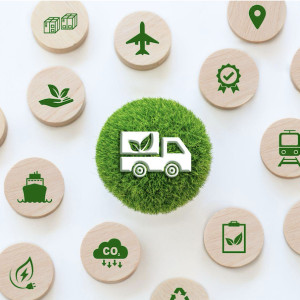Top 5 Sustainable Trucking Practices for 2025


Trucking isn't what it used to be. Honestly, even five years ago, nobody would have thought about things like emissions or fuel efficiency every single day. Now, it's everywhere--drivers, fleet managers, everyone's talking about it.
Fuel keeps going up, and the rules for trucks in cities are getting tighter. People care. Customers care.
Even random people on the road seem to notice when trucks belch smoke. So yeah, sustainability matters, whether companies like it or not.
1. Routes--Not Just Fast, Smart
You'd think drivers know the fastest way everywhere, right?
But no. Even experienced ones get caught in traffic jams, construction, or those weird one-way streets that eat up time. Checking a map, watching traffic apps, or sometimes just knowing your area makes a difference.
It doesn't have to be complicated. Some trucks use fancy GPS stuff, some just use experience. And here's the thing--saving a mile here or two minutes there doesn't seem like much, but over weeks?
It's huge. Less fuel, less stress, maybe even less grumpy bosses calling. Small wins, but real wins.
2.
Cleaner Trucks Are Not a Myth
Electric trucks--yeah, they're cool, but let's be honest, they're not everywhere yet. Charging stations aren't always around, and long-haul isn't easy. But hybrids, newer diesels, low-emission engines--they're actually worth it.
They save fuel, cut down smoke, and honestly, they look better than the old beat-up trucks. Governments help too. Tax breaks, grants, and access to special city zones.
Some fleets took the leap early and swear by it. And it's not just green points--it can save money, which is probably why they call it smart business.
3. Telematics, Data, and Training
Trucks today are like smartphones on wheels.
Sensors everywhere--tracking speed, brakes, idling, fuel use. Managers can see all this and help drivers drive better. Smooth braking, steady speeds, less idling.
Simple things. Training helps too. Drivers often know what to do, but seeing numbers makes it real.
And breaks matter. Mental breaks. A coffee, a stretch, or even a tiny check on an online casino or a video can reset your brain.
People underestimate that. Fatigue leads to wasteful driving and mistakes, so tiny pauses actually make a difference.
4. Maintenance Matters
Look, a truck isn't magic.
Tyres, engines, filters--they all need care. Underinflated tyres alone waste fuel like crazy. Dirty engines, old air filters, leaks... small stuff adds up.
Aerodynamic tweaks help too. Side skirts, roof things, trailer tails--they look minor, but across a fleet, it saves real money. And simple stuff like turning off the engine during long stops--people ignore it, but over time, it really counts.
Maintenance is boring, but it works.
5. Drivers Are Part of the System
This is the bit people forget. Drivers do the actual work.
If they're tired, stressed, or ignored, nothing else matters. Encouraging rest, safe driving, and little eco habits makes a huge difference. Some fleets give rewards for fuel-efficient driving or low-emission performance.
Little competitions, little recognition. It works. And yes, mental health matters.
People need breaks. Some drivers like a short walk, a chat, or even checking a casino replay for a few minutes--keeps them sane and focused. Not glamorous, but it matters.
What Are Some "best Practices" In Sustainable Transportation? - Civil Engineering Explained
Putting It All Together
Sustainable trucking isn't a single magic trick. It's a bunch of small things added together. Smarter routes, cleaner trucks, keeping them running, data-driven coaching, and looking after drivers.
That's it. No headline-grabbing jackpot moment here, just steady, boring, effective changes that actually work. The reality?
Companies ignoring this will pay more--fuel, repairs, fines, annoyed clients. Fleets that do it right? They save money, reduce emissions, and drivers are less miserable.
Small, human wins that actually stick. And yes, it's messy. Not perfect.
Not flashy. But trucking has never been about flashy. It's about getting stuff from A to B efficiently, safely, and now, sustainably.
That's the win that lasts.